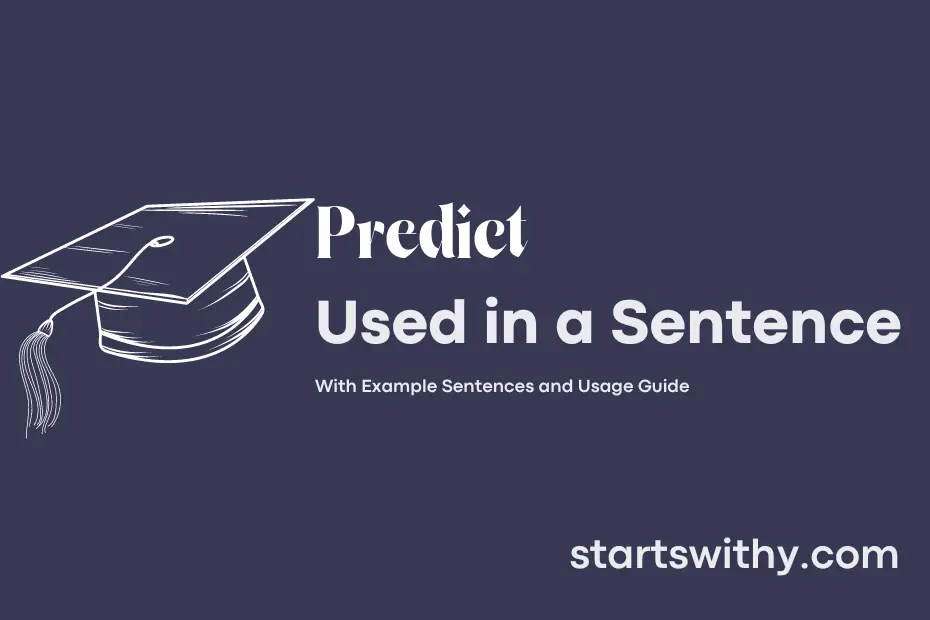Have you ever wondered how some people seem to be able to predict the outcome of certain events with remarkable accuracy? The ability to anticipate or foresee an outcome based on current information is known as predicting.
Predicting involves analyzing patterns, trends, and data to make an educated guess about what will happen in the future. It is a valuable skill used in various fields such as weather forecasting, stock market analysis, and sports betting. By understanding the factors at play and making informed predictions, individuals and organizations can make better decisions and prepare for what lies ahead.
7 Examples Of Predict Used In a Sentence For Kids
- Predict what color will the traffic light be next?
- Can you predict if it will rain today?
- Let’s predict which animal will win the race.
- Who can predict how many candies are in the jar?
- Predict which number comes next in this sequence.
- Try to predict which shape will fit in the puzzle.
- We will predict if the sun will shine tomorrow.
14 Sentences with Predict Examples
- Predict the outcome of the experiment based on the data collected.
- It is crucial to predict the trend of the stock market before making any investment decisions.
- Try to predict the questions that might come in the examination and prepare accordingly.
- Don’t wait until the last minute to predict the possible answers for the quiz.
- Use past year question papers to predict the pattern of questions in the upcoming exams.
- Utilize statistical models to predict the probability of an event occurring in your research project.
- The professor asked us to predict the impact of climate change on agricultural practices in India.
- Engineering students must predict the potential failures in their designs before implementing them.
- Predict the impact of technological advancements on your chosen field of study.
- MBA students often have to predict market trends to make informed business decisions.
- As a psychology student, you may be asked to predict human behavior in various scenarios.
- Predict the outcome of your performance in the upcoming sports competition based on your training regimen.
- Try to predict the challenges you may face while working on a group project and prepare for them.
- It is essential to predict the future demand for a product before launching it in the market.
How To Use Predict in Sentences?
Predict means to estimate or infer something before it actually happens. It is important to use this word correctly in a sentence to convey your thoughts accurately. Here’s a guide on how to use Predict in a sentence for beginners:
-
Subject-Verb-Object: Start your sentence with the subject performing the action, then use the verb predict, and end with the object being predicted. For example: “Scientists predict a rise in global temperatures due to climate change.”
-
Use of Adverbs and Adjectives: You can enhance your sentence by adding adverbs and adjectives to provide more context or detail. For instance: “Economists confidently predict a recession in the upcoming year.”
-
Tenses: Pay attention to the tense of the sentence. If you are talking about a prediction for the future, use future tense. For instance: “She predicts that the company will launch a new product next month.”
-
Context: Always provide some context to clarify the prediction being made. For example: “The weather forecast predicts heavy rain in the afternoon.”
-
Be Specific: If possible, specify who is making the prediction. For example: “Numerous polls predict that the incumbent will win the election.”
Remember to practice using Predict in different sentences to become more comfortable with its usage.
Conclusion
Based on the examples provided of sentences with the keyword “predict,” it is evident that prediction involves forecasting future events or outcomes based on available information. These sentences demonstrate the use of predictive statements to anticipate results or trends. Whether in weather forecasting, sports analysis, or scientific research, the ability to predict plays a crucial role in decision-making and planning.
Furthermore, by analyzing patterns, trends, and data, individuals can make informed predictions about various aspects of life. Despite the inherent uncertainty in predicting the future, honing this skill can lead to better preparation and risk management. In conclusion, the examples highlighted showcase the importance of prediction in a wide range of contexts and emphasize its value in guiding actions and strategies.



